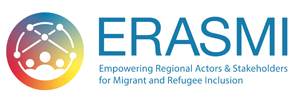Actors in the field of integration of refugees and migrants discuss about current challenges in network-based cooperation
For three years now, transfer workshops organized at the Department of Public Management of Harz University of Applied Sciences have already been a reliable forum for actors dealing with challenges of refugee and migrant integration at a regional level in Saxony-Anhalt. In the context of the current ERASMI project started in September 2019, regional cooperation and knowledge exchange among heterogeneous actors in the field will be even intensified and consolidated. Inter-agency network exchanges are to be established at a regional level not only in Saxony-Anhalt, but also in Turkey, Ireland, and Italy where other ERASMI partners are located.

On July, 8, 2020, participants from Saxony-Anhalt and neighbouring regions met in a two-hour video conference facilitated by professor Birgit Apfelbaum and her team members Robin Radom and Stefan Apitz to discuss current challenges of network-based cooperation in the context of Covid-19. For many of the more than 20 participating actors from public administration, universities, free welfare work, migrant organisations, private companies and projects conducted in the field of action, virtual communication has been an indispensable part of their everyday work for months anyway, as consultations with refugees and migrants and the exchange with colleagues from the field could often only be carried out using digital tools.

Christopher Bänecke from Diakonie Halberstadt reported on the challenges in migration counselling in the context of the pandemic. Besides the difficulty of maintaining the counselling services for refugees and migrants without personal contact, especially networking activities, which are essential for many practitioners, came to a standstill at the beginning of the containment and had to be re-established by developing “new” communication structures. After the contribution, the participants discussed in three small groups professional challenges they had to face, especially at the beginning of the corona restrictions, and possible solutions for their successful coping. There was consensus that, even under the current difficult conditions, cooperative approaches, both within the framework of institutionalised networks and in case-related cooperation, contribute significantly to the success of solution-oriented exchange of knowledge and experience. The development and expansion of digital skills is also an opportunity for further professionalisation.
Within the framework of the ERASMI project, regional actors in the field of migration and refugees in Saxony-Anhalt will continue to be offered a regular forum in upcoming regional network meetings.




